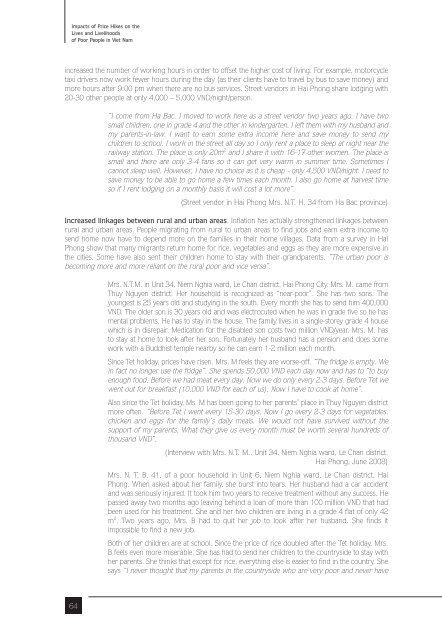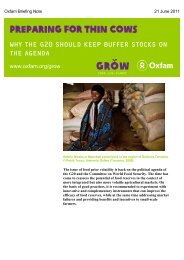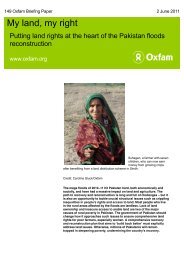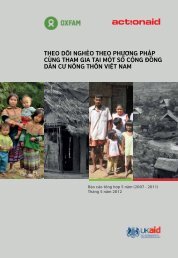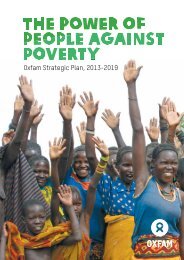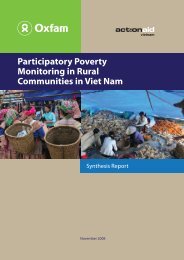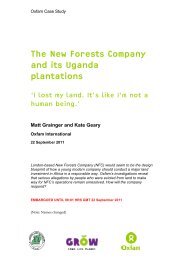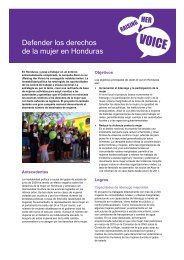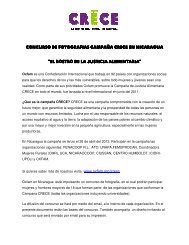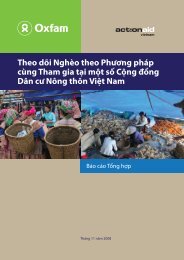Untitled - Oxfam Blogs
Untitled - Oxfam Blogs
Untitled - Oxfam Blogs
Create successful ePaper yourself
Turn your PDF publications into a flip-book with our unique Google optimized e-Paper software.
Impacts of Price Hikes on the<br />
Lives and Livelihoods<br />
of Poor People in Viet Nam<br />
increased the number of working hours in order to offset the higher cost of living. For example, motorcycle<br />
taxi drivers now work fewer hours during the day (as their clients have to travel by bus to save money) and<br />
more hours after 9:00 pm when there are no bus services. Street vendors in Hai Phong share lodging with<br />
20-30 other people at only 4,000 – 5,000 VND/night/person.<br />
“I come from Ha Bac. I moved to work here as a street vendor two years ago. I have two<br />
small children, one in grade 4 and the other in kindergarten. I left them with my husband and<br />
my parents-in-law. I want to earn some extra income here and save money to send my<br />
children to school. I work in the street all day so I only rent a place to sleep at night near the<br />
railway station. The place is only 20m 2 and I share it with 16-17 other women. The place is<br />
small and there are only 3-4 fans so it can get very warm in summer time. Sometimes I<br />
cannot sleep well. However, I have no choice as it is cheap - only 4,500 VND/night. I need to<br />
save money to be able to go home a few times each month. I also go home at harvest time<br />
so if I rent lodging on a monthly basis it will cost a lot more”.<br />
(Street vendor in Hai Phong Mrs. N.T. H, 34 from Ha Bac province)<br />
Increased linkages between rural and urban areas. Inflation has actually strengthened linkages between<br />
rural and urban areas. People migrating from rural to urban areas to find jobs and earn extra income to<br />
send home now have to depend more on the families in their home villages. Data from a survey in Hai<br />
Phong show that many migrants return home for rice, vegetables and eggs as they are more expensive in<br />
the cities. Some have also sent their children home to stay with their grandparents. “The urban poor is<br />
becoming more and more reliant on the rural poor and vice versa”.<br />
Mrs. N.T.M. in Unit 34, Niem Nghia ward, Le Chan district, Hai Phong City. Mrs. M. came from<br />
Thuy Nguyen district. Her household is recognized as “near-poor”. She has two sons. The<br />
youngest is 25 years old and studying in the south. Every month she has to send him 400,000<br />
VND. The older son is 30 years old and was electrocuted when he was in grade five so he has<br />
mental problems. He has to stay in the house. The family lives in a single-storey grade 4 house<br />
which is in disrepair. Medication for the disabled son costs two million VND/year. Mrs. M. has<br />
to stay at home to look after her son. Fortunately her husband has a pension and does some<br />
work with a Buddhist temple nearby so he can earn 1-2 million each month.<br />
Since Tet holiday, prices have risen. Mrs. M feels they are worse-off. “The fridge is empty. We<br />
in fact no longer use the fridge”. She spends 50,000 VND each day now and has to “to buy<br />
enough food. Before we had meat every day. Now we do only every 2-3 days. Before Tet we<br />
went out for breakfast (10,000 VND for each of us). Now I have to cook at home”.<br />
Also since the Tet holiday, Ms. M has been going to her parents’ place in Thuy Nguyen district<br />
more often. “Before Tet I went every 15-30 days. Now I go every 2-3 days for vegetables,<br />
chicken and eggs for the family’s daily meals. We would not have survived without the<br />
support of my parents. What they give us every month must be worth several hundreds of<br />
thousand VND”.<br />
(Interview with Mrs. N.T. M., Unit 34, Niem Nghia ward, Le Chan district,<br />
Hai Phong, June 2008)<br />
Mrs. N. T. B, 41, of a poor household in Unit 6, Niem Nghia ward, Le Chan district, Hai<br />
Phong. When asked about her family, she burst into tears. Her husband had a car accident<br />
and was seriously injured. It took him two years to receive treatment without any success. He<br />
passed away two months ago leaving behind a loan of more than 100 million VND that had<br />
been used for his treatment. She and her two children are living in a grade 4 flat of only 42<br />
m 2 . Two years ago, Mrs. B had to quit her job to look after her husband. She finds it<br />
impossible to find a new job.<br />
Both of her children are at school. Since the price of rice doubled after the Tet holiday, Mrs.<br />
B feels even more miserable. She has had to send her children to the countryside to stay with<br />
her parents. She thinks that except for rice, everything else is easier to find in the country. She<br />
says “I never thought that my parents in the countryside who are very poor and never have<br />
64


